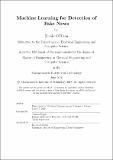Machine learning for detection of fake news
Author(s)
O'Brien, Nicole (Nicole J.)
DownloadFull printable version (3.367Mb)
Other Contributors
Massachusetts Institute of Technology. Department of Electrical Engineering and Computer Science.
Advisor
Tomaso Poggio.
Terms of use
Metadata
Show full item recordAbstract
Recent political events have lead to an increase in the popularity and spread of fake news. As demonstrated by the widespread effects of the large onset of fake news, humans are inconsistent if not outright poor detectors of fake news. With this, efforts have been made to automate the process of fake news detection. The most popular of such attempts include "blacklists" of sources and authors that are unreliable. While these tools are useful, in order to create a more complete end to end solution, we need to account for more difficult cases where reliable sources and authors release fake news. As such, the goal of this project was to create a tool for detecting the language patterns that characterize fake and real news through the use of machine learning and natural language processing techniques. The results of this project demonstrate the ability for machine learning to be useful in this task. We have built a model that catches many intuitive indications of real and fake news as well as an application that aids in the visualization of the classification decision.
Description
Thesis: M. Eng., Massachusetts Institute of Technology, Department of Electrical Engineering and Computer Science, 2018. This electronic version was submitted by the student author. The certified thesis is available in the Institute Archives and Special Collections. Cataloged from student-submitted PDF version of thesis. Includes bibliographical references (pages 55-56).
Date issued
2018Department
Massachusetts Institute of Technology. Department of Electrical Engineering and Computer SciencePublisher
Massachusetts Institute of Technology
Keywords
Electrical Engineering and Computer Science.